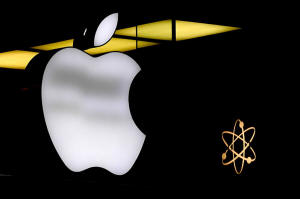European Union lays out how Apple must open its tech up to competitors
under bloc's digital rules
[March 20, 2025] By
KELVIN CHAN
LONDON (AP) — The European Union on Wednesday outlined the steps that
Apple must take to open up its iPhone and iPad operating systems to work
better with competing technologies.
It’s the first time the EU has moved to compel a technology company to
comply with the bloc’s digital Digital Markets Act — a wide-ranging set
of regulations designed to prevent Big Tech “gatekeeper” companies from
cornering markets.
After the DMA took effect a year ago, the EU’s executive Commission
moved swiftly to open a raft of investigations into Big Tech companies.
Brussels also opened two “ specification proceedings ” in September to
spell out what Apple needs to do under the DMA, which aims to make
digital markets “fairer” and “more contestable” by breaking up closed
tech ecosystems that lock consumers into a single company’s products or
services.
In its legally binding decision, the commission detailed measures that
the iPhone maker has to take involving nine connectivity features for
its iOS operating system.
The measures will give device and app makers better access to iPhone
features that work with devices. For example, iPhone users will have
“enhanced possibilities” to receive notifications on non-Apple
smartwatches, including receiving pictures and the ability to reply to
them. Users could also benefit from more seamless pairing of wireless
headphones from other brands.

Access to Apple's wireless file transfer technology would let
third-party developers create apps similar to the AirDrop feature.
The commission also laid out a second set of measures to make the
process for software developers requesting access to iPhone features
more transparent and effective. Among the changes are better access to
technical documentation not yet available to third parties, it said.
With its decision, Brussels is "providing regulatory certainty both to
Apple and to developers,” the European Commission Executive Vice
President Teresa Ribera said in a press release.
“Effective interoperability" for will mean “better choice for consumers
in the fast-growing market for innovative connected devices,” she said.
European consumer group BEUC hailed the decision.
“For too long, Apple has operated a walled garden around its products
and prevented interoperability," Director General Agustin Reyna said.
Apple, however, voiced its unhappiness, saying it's bad for the
company's products and for European users.
“Today’s decisions wrap us in red tape, slowing down Apple’s ability to
innovate for users in Europe and forcing us to give away our new
features for free to companies who don’t have to play by the same
rules,” the company said in a statement.
[to top of second column] |

The Apple logo is illuminated at a store in Munich, Germany,
Monday, Nov. 13, 2023. AP Photo/Matthias Schrader, File)
 Apple said it will continue to work
with the European Commission to "help them understand our concerns
on behalf of our users.”
The Commission also said Wednesday that Google wasn’t doing enough
to comply with DMA. Despite making changes, including removing
flight listings, Google was still giving preference to its own
services in search results, it said.
Google is also failing to let app developers steer users to cheaper
options outside its Google Play Store app marketplace, the
commission said in preliminary findings. While it's acceptable for
Google to charge a fee for downloading an app in its app store, the
company is charging fees that "go beyond what is justified," for
every purchase of digital goods or services, it said.
Google said the EU findings will require the company to make even
more changes to how it displays some search results, “which would
make it harder for people to find what they are looking for and
reduce traffic to European businesses. This is, quite simply,
misguided.”
The commission's app store findings, meanwhile, “create a false
choice between openness and security" and risk exposing Europe users
to more “malware and fraud,” it added.
Google now has the chance to reply to the findings.
If the commission decides Google is in “non-compliance” with the
DMA, it can issue a fine of up to 10% of the company's annual global
revenue. But officials have said that they want to avoid issuing
blockbuster fines and instead negotiate with companies to get them
to comply.
The EU's crack down on the global tech industry has irritated
President Donald Trump, who recently blasted the bloc’s hefty
antitrust fines for U.S. tech companies. Vice-President JD Vance,
meanwhile, has railed against excessive AI regulation, in a rebuke
aimed at the EU’s sweeping Artificial Intelligence Act.

However, both companies have been under pressure in the U.S. too.
Apple is facing a Justice Department antitrust lawsuit accusing it
of engineering an illegal smartphone monopoly. Meanwhile, federal
antitrust regulators are seeking to break up Google after a federal
judge ruled Google’s ubiquitous search engine has been illegally
exploiting its dominance to squash competition and stifle
innovation.
All contents © copyright 2025 Associated Press. All rights reserved |